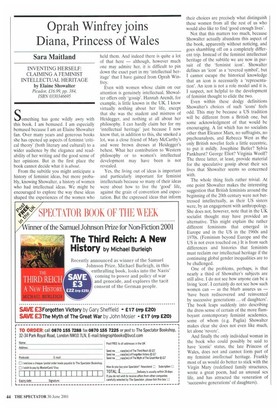Oprah Winfrey joins Diana, Princess of Wales
Sara Maitland
INVENTING HERSELF: CLAIMING A FEMINIST INTELLECTUAL HERITAGE by Elaine Showalter Picador, £16.99, pp. 384, ISBN 0330346695 Something has gone wildly awry with this book. I am bemused. I am especially bemused because I am an Elaine Showalter fan. Over many years and generous books she has opened up aspects of feminist 'critical theory' (both literary and cultural) to a wider audience by the elegance and readability of her writing and the good sense of her opinions. But in the first place the book cannot decide what it is about.
From the subtitle you might anticipate a history of feminist ideas, but more probably, knowing Showalter, a history of women who had intellectual ideas. We might be encouraged to explore the way these ideas shaped the experiences of the women who held them. And indeed there is quite a lot of that here — although, however much one may admire her, it is difficult to pin down the exact part in my 'intellectual heritage' that I have gained from Oprah Winfrey.
Even with women whose claim on our attention is genuinely intellectual, Showalter offers only 'gossip'. Hannah Arendt, for example, is little known in the UK. I know virtually nothing about her life, except that she was the student and mistress of Heidegger, and nothing at all about her philosophy. I can hardly claim her for my 'intellectual heritage' just because I now know that, in addition to this, she smoked a lot, was a close friend of Mary McCarthy's and wore brown dresses at Heidegger's behest. What her contribution to Western philosophy or to women's intellectual development may have been is not revealed.
Yes, the living out of ideas is important and particularly important for feminist intellectuals because so many of their ideas were about how to live the 'good' life, against the grain of convention and expectation. But the expressed ideas that inform their choices are precisely what distinguish these women from all the rest of us who would also like to find 'good enough lives'.
Not that this matters too much, because Showalter actually abandons this aspect of the book, apparently without noticing, and goes shambling off on a completely different trip. Instead of the feminist intellectual heritage of the subtitle we are now in pursuit of the 'feminist icon'. Showalter defines an 'icon' as a 'revered symbol', but I cannot escape the historical knowledge that an icon is necessarily a 'representation'. An icon is not a role model and it is, I suspect, not helpful to the development of feminist thought to elide the two.
Even within these dodgy definitions Showalter's choices of such 'icons' feels odd. This may be because a US tradition will be different from a British one, but some acknowledgment of that would be encouraging. A list which has no socialists other than Eleanor Marx, no suffragists, no psychoanalysts, and Rebecca West as the only British novelist feels a little eccentric, to put it mildly. Josephine Butler? Sylvia Pankhurst? George Eliot? Virginia Woolf? The three latter, at least, provide material for the speculative gossip about their sex lives that Showalter seems so concerned with.
The whole thing feels rather trivial. At one point Showalter makes the interesting suggestion that British feminists around the beginning of the 20th century were not buttressed intellectually, as their US sisters were, by an engagement with anthropology. She does not, however, note that in the UK socialist thought may have provided an alternative. This might explain the rather different feminisms that emerged in Europe and in the US in the 1960s and 1970s. (Feminism beyond Europe and the US is not even touched on.) It is from such differences and histories that feminists must reclaim our intellectual heritage if the continuing global gender inequalities are to be challenged.
One of the problems, perhaps, is that nearly a third of Showalter's subjects are still alive. I do not see how anyone can be a living `icon'. I certainly do not see how such women can — as the blurb assures us — `have been rediscovered and reinvented by successive generations ... of daughters'. The book leaps suddenly into describing the dress sense of certain of the more flamboyant contemporary feminist academics, some of whom (e.g. Paglia) Showalter makes clear she does not even like much, let alone 'revere'.
And finally the only individual woman in the book who could possibly be said to have 'iconic' status, the late Princess of Wales, does not and cannot form part of my feminist intellectual heritage. Frankly most of us would do better to stick with the Virgin Mary (redefined family structures, wrote a great poem, had an unusual sex life, and has attracted the veneration of `successive generations' of daughters).










































































 Previous page
Previous page